Taiwan wrapped up an annual film festival with an awards ceremony Saturday night as it holds more public events after keeping its coronavirus outbreak to a few hundred cases.
Actors and others lined up for photo shoots with no social distancing, and participants didn’t wear masks in historic Zhongshan Hall in Taipei. Taiwan, with a population of about 23 million people, has had 451 confirmed cases and seven deaths.
A baseball game in the city of Taichung on Saturday drew more than 10,000 fans for the first time this season, the official Central News Agency said. Health authorities said last week that fans would be allowed to sit in alternate seats and no longer would have to wear masks, except when leaving their seats.

Taiwanese actress Gingle Wang, right, and Taiwanese actor Mo Tzu-yi hold their awards for Best Actress and Best Actor at the 2020 Taipei Film Festival in Taipei, Taiwan, Saturday, July 11, 2020. The 2020 Taipei Film Festival is the world's first large-scale film festival held by an entity after the outbreak of the COVID-19 epidemic. (AP PhotoChiang Ying-ying)
The horror film “Detention,” set during martial law in Taiwan in the 1960s, was the biggest winner at the Taipei Film Festival, taking six awards including the Grand Prize and Best Actress for 22-year-old Gingle Wang.
Chang Jung-chi, the Best Director winner for “We Are Champions,” said the virus outbreak had forced him to slow down his work. “This comes to me like a friend patting my shoulder and saying, ‘Hang in there,’ ” he said.
Follow all of AP’s pandemic coverage at http://apnews.com/VirusOutbreak and https://apnews.com/UnderstandingtheOutbreak

Taiwanese actress Gingle Wang kisses her award for Best Actress at the 2020 Taipei Film Festival in Taipei, Taiwan, Saturday, July 11, 2020. The 2020 Taipei Film Festival is the world's first large-scale film festival held by an entity after the outbreak of the COVID-19 epidemic. (AP PhotoChiang Ying-ying)

Taiwanese actor Mo Tzu-yi poses on the red carpet at the 2020 Taipei Film Festival in Taipei, Taiwan, Saturday, July 11, 2020. Mo is nominated for Best Actor for the film "Dear Tenant" at this year's awards. The 2020 Taipei Film Festival is the world's first large-scale film festival held after the outbreak of the COVID-19 epidemic. (AP PhotoChiang Ying-ying)

Taiwanese actress Ding Ning poses on the red carpet at the 2020 Taipei Film Festival in Taipei, Taiwan, Saturday, July 11, 2020. Ding is nominated for Best Supporting Actress for the film "Viatical Settlement" at this year's awards. The 2020 Taipei Film Festival is the world's first large-scale film festival held after the outbreak of the COVID-19 epidemic. (AP PhotoChiang Ying-ying)
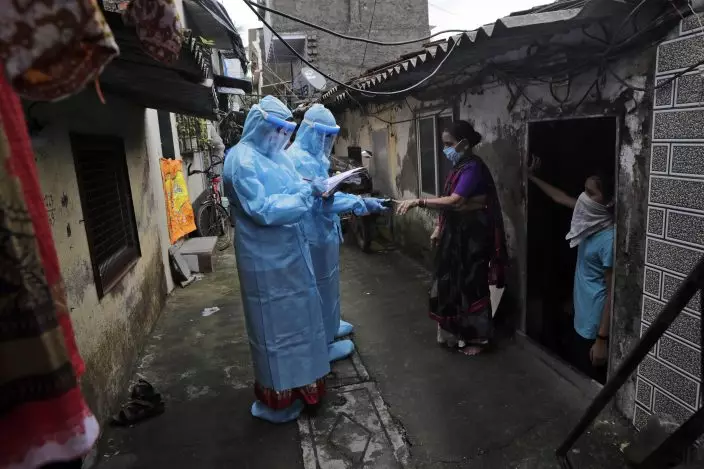
Health workers screen residents for COVID-19 symptoms at Deonar slum in Mumbai, India, Saturday, July 11, 2020. In just three weeks, India went from the world’s sixth worst-affected country by the coronavirus to the third, according to a tally by Johns Hopkins University. India's fragile health system was bolstered during a stringent monthslong lockdown but could still be overwhelmed by an exponential rise in infections. (AP PhotoRajanish Kakade)
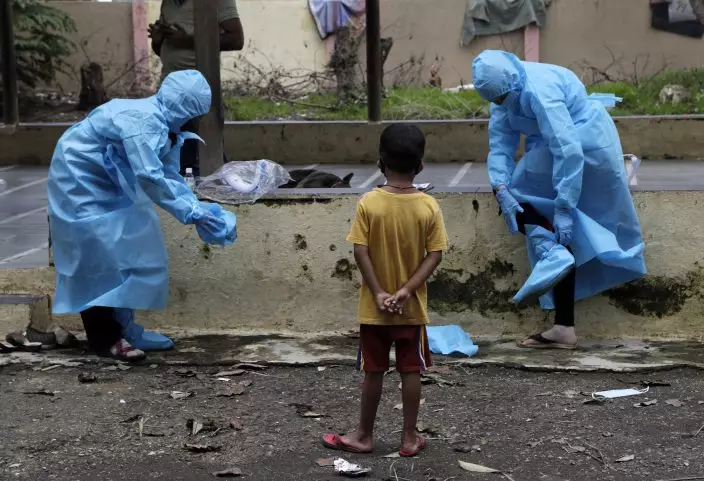
Health workers remove their protective gear after screening residents for COVID-19 symptoms at Deonar slum in Mumbai, India, Saturday, July 11, 2020. In just three weeks, India went from the world’s sixth worst-affected country by the coronavirus to the third, according to a tally by Johns Hopkins University. India's fragile health system was bolstered during a stringent monthslong lockdown but could still be overwhelmed by an exponential rise in infections. (AP PhotoRajanish Kakade)
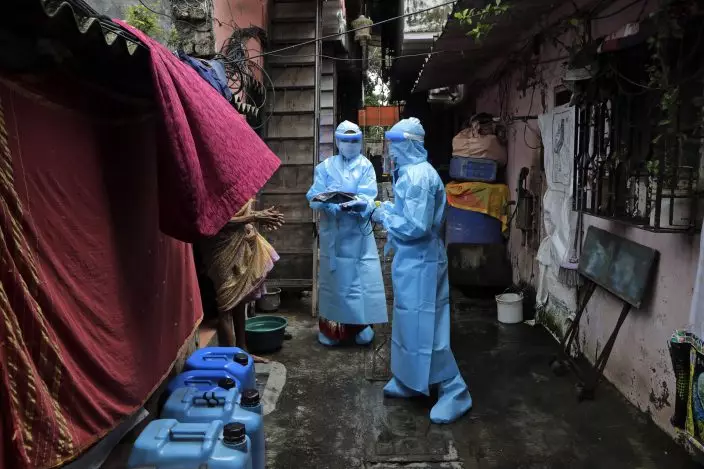
Health workers screen residents for COVID-19 symptoms at Deonar slum in Mumbai, India, Saturday, July 11, 2020. In just three weeks, India went from the world’s sixth worst-affected country by the coronavirus to the third, according to a tally by Johns Hopkins University. India's fragile health system was bolstered during a stringent monthslong lockdown but could still be overwhelmed by an exponential rise in infections. (AP PhotoRajanish Kakade)
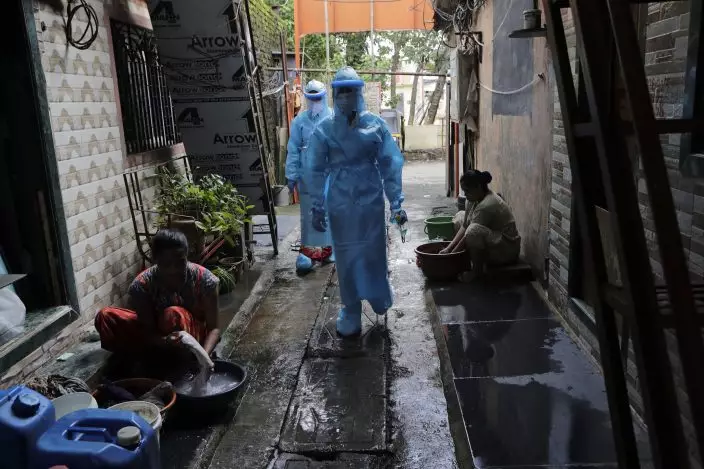
Health workers walk to screen residents for COVID-19 symptoms at Deonar slum in Mumbai, India, Saturday, July 11, 2020. In just three weeks, India went from the world’s sixth worst-affected country by the coronavirus to the third, according to a tally by Johns Hopkins University. India's fragile health system was bolstered during a stringent monthslong lockdown but could still be overwhelmed by an exponential rise in infections. (AP PhotoRajanish Kakade)
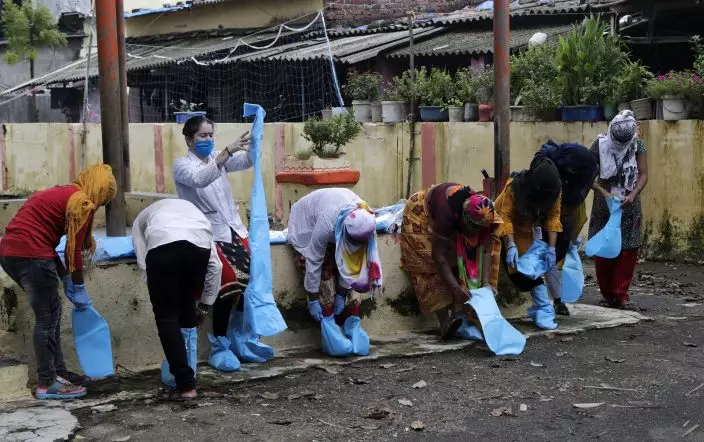
Health workers gear up to screen people for COVID-19 symptoms at Deonar slum in Mumbai, India, Saturday, July 11, 2020. In just three weeks, India went from the world’s sixth worst-affected country by the coronavirus to the third, according to a tally by Johns Hopkins University. India's fragile health system was bolstered during a stringent monthslong lockdown but could still be overwhelmed by an exponential rise in infections. (AP PhotoRajanish Kakade)
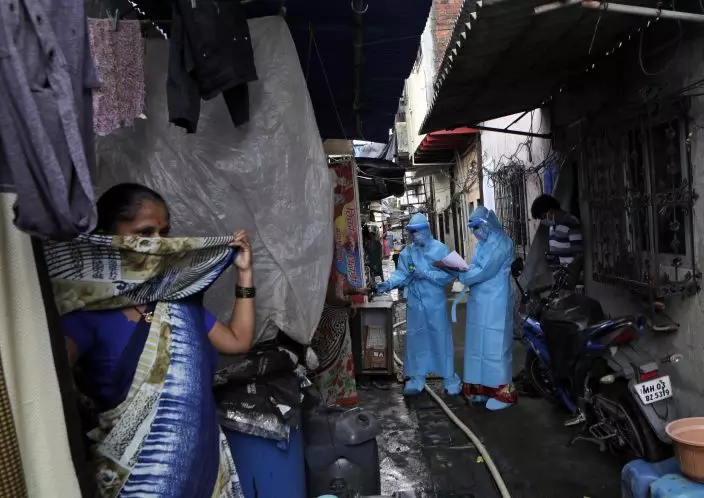
Health workers screen residents for COVID-19 symptoms at Deonar slum in Mumbai, India, Saturday, July 11, 2020. In just three weeks, India went from the world’s sixth worst-affected country by the coronavirus to the third, according to a tally by Johns Hopkins University. India's fragile health system was bolstered during a stringent monthslong lockdown but could still be overwhelmed by an exponential rise in infections. (AP PhotoRajanish Kakade)
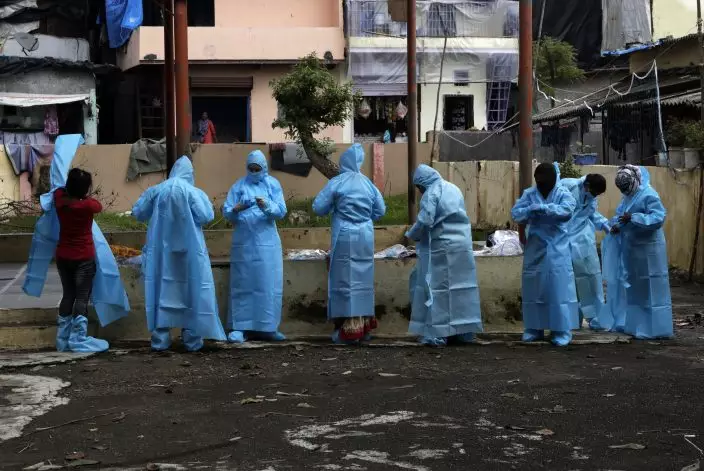
Health workers get into their gear screen residents for COVID-19 symptoms at Deonar slum in Mumbai, India, Saturday, July 11, 2020. In just three weeks, India went from the world’s sixth worst-affected country by the coronavirus to the third, according to a tally by Johns Hopkins University. India's fragile health system was bolstered during a stringent monthslong lockdown but could still be overwhelmed by an exponential rise in infections. (AP PhotoRajanish Kakade)
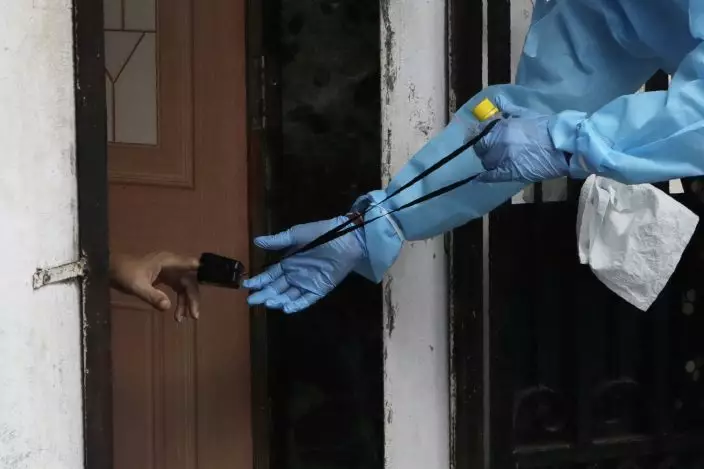
A health worker screens residents for COVID-19 symptoms at Deonar slum in Mumbai, India, Saturday, July 11, 2020. In just three weeks, India went from the world’s sixth worst-affected country by the coronavirus to the third, according to a tally by Johns Hopkins University. India's fragile health system was bolstered during a stringent monthslong lockdown but could still be overwhelmed by an exponential rise in infections. (AP PhotoRajanish Kakade)
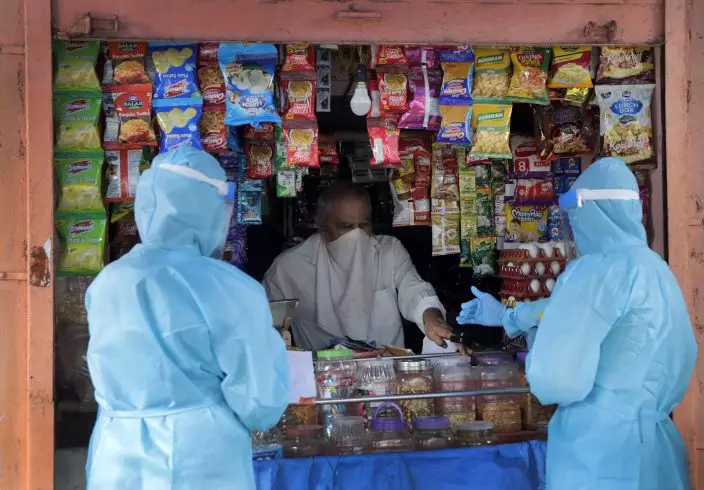
Health workers screen residents for COVID-19 symptoms at Deonar slum in Mumbai, India, Saturday, July 11, 2020. In just three weeks, India went from the world’s sixth worst-affected country by the coronavirus to the third, according to a tally by Johns Hopkins University. India's fragile health system was bolstered during a stringent monthslong lockdown but could still be overwhelmed by an exponential rise in infections. (AP PhotoRajanish Kakade)
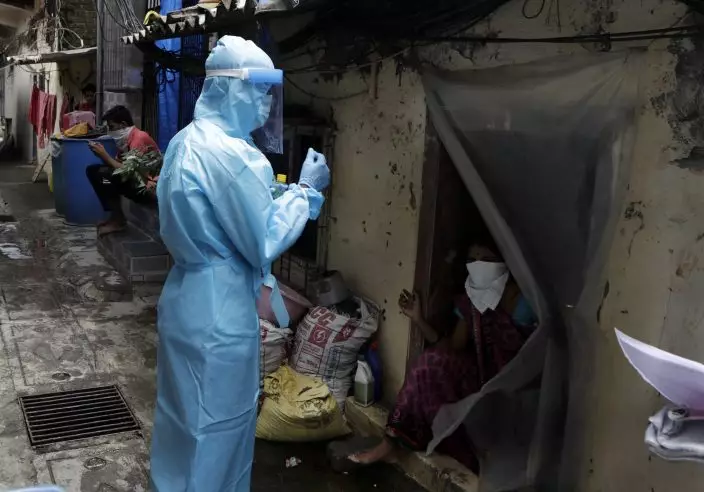
Health workers screen people for COVID-19 symptoms at Deonar slum in Mumbai, India, Saturday, July 11, 2020. In just three weeks, India went from the world’s sixth worst-affected country by the coronavirus to the third, according to a tally by Johns Hopkins University. India's fragile health system was bolstered during a stringent monthslong lockdown but could still be overwhelmed by an exponential rise in infections. (AP PhotoRajanish Kakade)
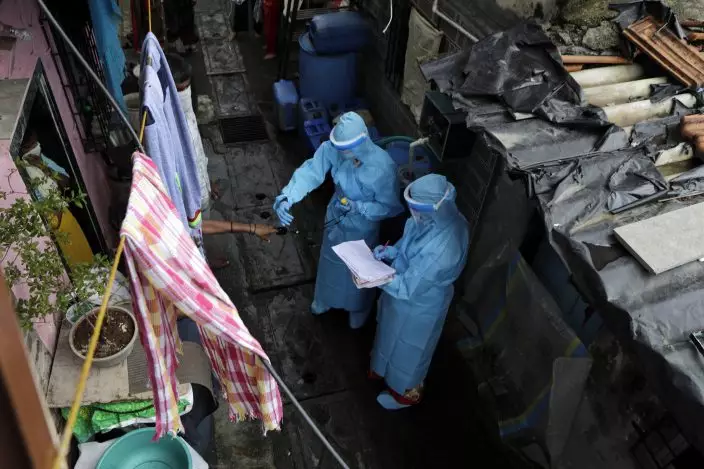
Health workers screen people for COVID-19 symptoms at Deonar slum in Mumbai, India, Saturday, July 11, 2020. In just three weeks, India went from the world’s sixth worst-affected country by the coronavirus to the third, according to a tally by Johns Hopkins University. India's fragile health system was bolstered during a stringent monthslong lockdown but could still be overwhelmed by an exponential rise in infections. (AP PhotoRajanish Kakade)
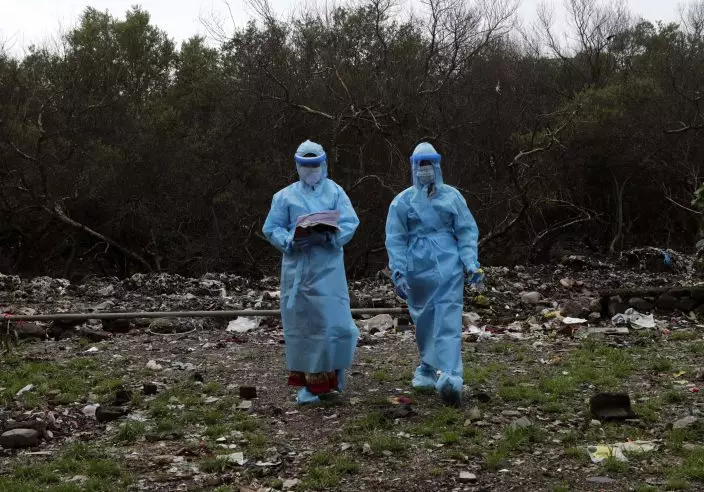
Health workers walk to screen people for COVID-19 symptoms at Deonar slum in Mumbai, India, Saturday, July 11, 2020. In just three weeks, India went from the world’s sixth worst-affected country by the coronavirus to the third, according to a tally by Johns Hopkins University. India's fragile health system was bolstered during a stringent monthslong lockdown but could still be overwhelmed by an exponential rise in infections. (AP PhotoRajanish Kakade)


